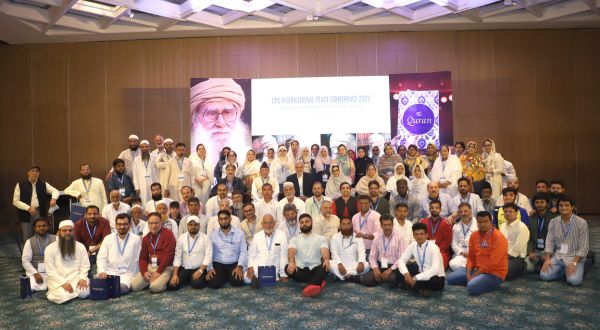LIFE: MAULANA WAHIDUDDIN KHAN
Islam’s Spiritual Ambassador to the World

Maulana Wahiduddin Khan (1925-2021) was a world-renowned Islamic Scholar, Spiritual Guide, and Ambassador of Peace who presented Islam in a contemporary style to address modern minds. Having rediscovered Islam as it is enshrined in its original sources—Quran and Sunnah, he presented it as a completely suitable ideology for the modern age. It was his dream to present the original teachings of Islam in the modern idiom as a religion of peace, spirituality, and co-existence. He founded the Centre for Peace and Spirituality, CPS International as a non-profit, non-political, and non-governmental organization in January 2001 to make this a reality on universal lines. A book titled, The 500 Most Influential Muslims of 2009, published by Georgetown University, Washington DC, declares Maulana to be “Islam’s Spiritual Ambassador to the World.” His approach, the book points out, is “popular among Indians, both Muslim and non-Muslim.”
A CHILD OF NATURE
Intellectual Journey towards God-Consciousness

Maulana Wahiduddin Khan was born on 1 January 1925 at Badharia, a village near Azamgarh. He had a close bond with his father, Fariduddin Khan who passed away when Maulana was five. Orphanhood was a great challenge for him. Earlier, his father was everything to him, after his father’s demise, God became his sole concern. This was the beginning of his intellectual journey toward God-consciousness. The world of nature became his silent teacher. Sitting for hours on the local bridge, he watched scenes of water flowing in the river below and sunrise and sunset above. Nature taught Maulana the lesson of universal morality. He saw the glory of the Creator in His creation. Linking him to the eternal world of God, sowed in him the seeds of the natural and scientific way of thinking that was to form his thoughts later in life.
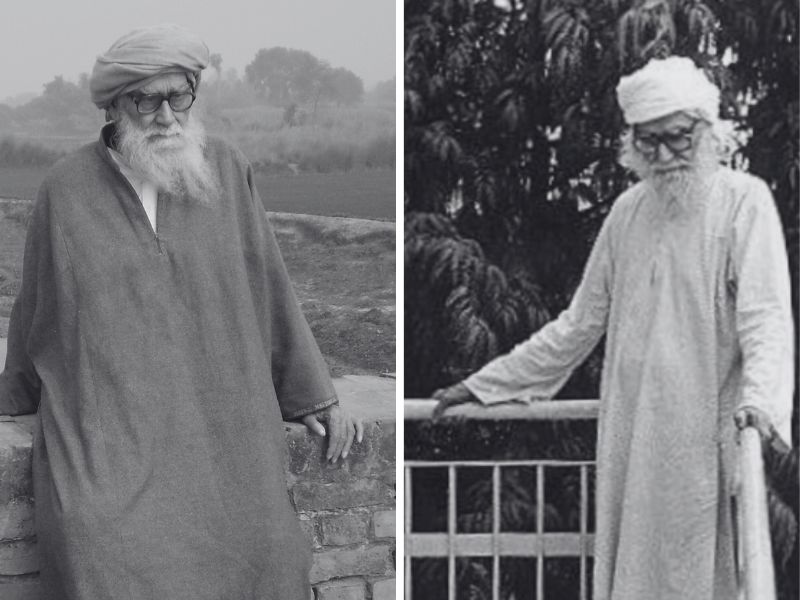
EDUCATION AND INTELLECTUAL CHALLENGES
A Lifetime of Dedicated Learning

While most people in Maulana’s family were sent to Western-style schools, his uncle Sufi Abdul Majeed Khan arranged for Maulana’s education at a traditional Islamic seminary the Madrasatul Islah in Sarai Mir, near Azamgarh in 1938. At this madrasa, the Quran was considered the most important book, while Hadith, Arabic, and other traditional subjects continued to be taught. His education at Madrasatul Islah laid the foundation of Maulana’s religious base. After completing his education in 1944, when he interacted with the modern educated, Maulana realized that their questions presented an intellectual challenge to him. This was a period of great introspection and disillusionment with the traditional understanding of Islam. He immersed himself in the study of the English language. After having a good command of English, he spent several years learning modern thought. Then he embarked on rediscovering Islam through a deeper study of the Quran, Commentaries of the Quran in Arabic and important books of Hadith. His life essentially can be described as a lifetime of dedicated learning.
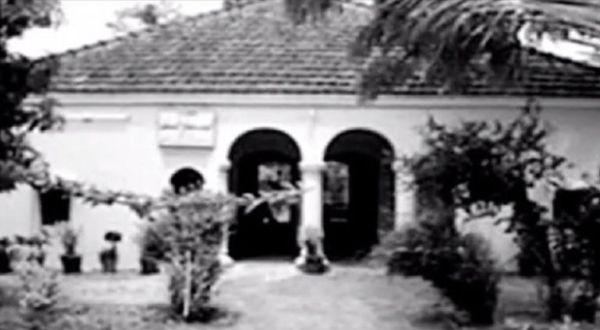
DISCOVERY OF TRUTH
A Journey Towards God-Realization

Maulana’s search for God began soon after completing his education. It was probably in 1945 when he stood under the papaya tree in the courtyard of the Jama Masjid of Azamgarh, his eyes full of tears, that these words came to his lips: “Khudawand tu kab aayega. Main kab tak tere aane ka intezar karun?” (O Lord, when will You come? For how long have I to wait for Your coming?) He went through various stages until he discovered the truth in the form of Islam. Then he devoted himself full-time to proclaiming the truth. It was probably in 1948 when a big annual book fair was held in Azamgarh that he secured a bookstall with Islamic books, and placed a big signboard above the stall in bold letters: “And God calls to the home of peace.” (Quran, 11:25) In essence, his life was a journey to God, he used to say, “This life for me, is waiting in anticipation for the day when God Almighty appears directly before mankind and when I will welcome Him with tears full of joy and awe.”
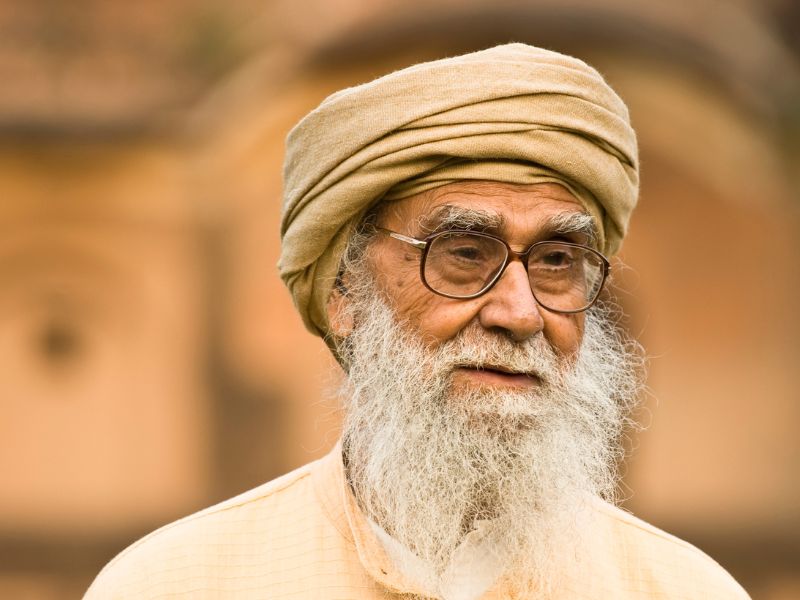
ON THE THRESHOLD OF A NEW ERA
Need to Present Islam in Contemporary Style

In 1955, the Daily, Qaumi Awaz (Lucknow) published an article stating: “We stand at the door of a new age.” After reading this article, Maulana Wahiduddin Khan’s life entered a new phase of search and study, which was spread over almost the whole of his later life. He wrote his first article in 1955, titled “Naye Ahd Ke Darwaze Par” (On the Threshold of a New Era). He learned English to go directly to the sources of modern thought. Developing a voracious appetite for knowledge, he spent entire days in libraries. His primary concern became to present Islam as a perfectly suitable ideology for the modern age. After an exhaustive study, he wrote the book, Ilm-e-Jadid Ka Challenge (1967). Thereafter he wrote more than 200 books and recorded thousands of lectures with the aim of addressing contemporary minds. All his writings and speeches are a rational affirmation of Islam to address modern minds.
REDISCOVERY OF ISLAM
Presenting Islam in Contemporary Style

Maulana Wahiduddin Khan realized that an intellectual gap exists between the representatives of Islam who present Islam in traditional style and modern scientific minds. Changed situations in every age demand that efforts be made towards adaptation of the injunctions of Islam to meet new exigencies. He read the Quran and the Hadith and Seerah of the Prophet directly in Arabic. This study was not a study in the simple sense, for throughout almost the whole study, his eyes were full of tears, testifying that this was undoubtedly the truth. After an in-depth study of the Quran and Sunnah, Maulana rediscovered Islam. After this deep study, Maulana presented Islam as a perfectly suitable ideology for the modern age based on freedom, peace, and coexistence. Anyone who wants to understand Islam need only turn to his literature and talks. Explore his literature, videos, and audios.
REFUTING POLITICAL INTERPRETATION OF ISLAM
Presenting A Counter-Ideology

Maulana Wahiduddin Khan joined Jamat-e Islami Hind in 1948. Upon a deep study of the writings of its founder, Maulana Abul Ala Maududi (d. 1979), he realized that they were ‘politically oriented’, whereas Islam is a God-oriented religion. Leaving the Jamaat in 1962, Maulana published the book Taʿbir ki Ghalati (‘Error of Interpretation’) in 1963. He explained that the political interpretation of Islam has no sanction in the Quran or Sunnah. It is a case of political extremism termed ghulu. Islam teaches us not to be extremists in our religion: “Commit no excesses in your religion.” (4:171) Islam is a religion of peace. Its teachings are the subject of self-following on one’s own free will; while the political interpretation has been misinterpreted to be a subject of implementation on others by force, which leads to violence and confrontation. He presented the counter ideology to re-engineer minds toward peace in many of his books like The Age of Peace, The Prophet of Peace. After reading them many people have left the path of violence.
GOD ARISES
Rational Interpretation of Religion

In his book Mazhab aur Jadeed Challenge (1967) [English: God Arises (1985); Arabic: Al-Islam Yatahadda (1974)], Maulana Wahiduddin Khan provides rational arguments for religious truths like the existence of God, the Hereafter, Prophethood, the veracity of the Quran, cosmic recording, besides others. The book, accepted as the standard Islamic position on modern thought, explains that although God cannot be seen, the effect of His creation–the universe–can always be seen by everyone. If we believe in the existence of the universe–the effect of God’s creation–we have to believe in the Creator of the universe as science accepts the inferential argument. Hence “The options one has to take is not between the ‘Universe without God’ and the ‘Universe with God’, instead it is between the ‘Universe with God’ or ‘No Universe at all.’
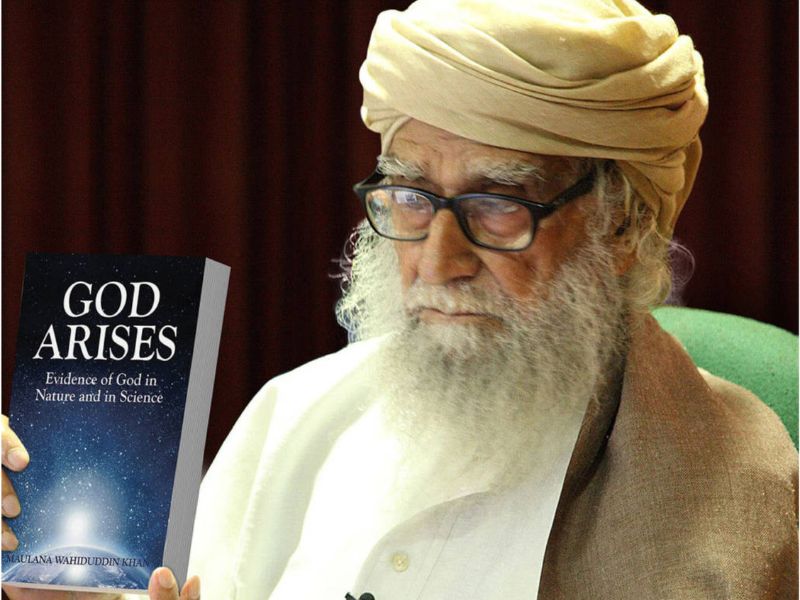
THE VISION AND MISSION OF ISLAM
Role of Muslims: Callers to God and Paradise

The culmination of Maulana’s research was his book, Al Islam, (1977) [English: The Vision of Islam (2014)]. The book explains that God created man and gave him freedom that will be taken away at death. After life in this world, a new life will begin in the Hereafter. There, people will be divided into two groups: those who made proper use of their freedom, submitting to the will of God will enter Paradise; and those who were fearless of God, misusing their freedom, will face eternal punishment. God sent a series of messengers from Prophet Adam to Prophet Muhammad to make man aware of this reality. Maulana explained that Muslims, as the ummah of the last prophet, Muhammad, have the responsibility of conveying this divine message to all humanity, generation after generation. This is the vision and mission of Islam.
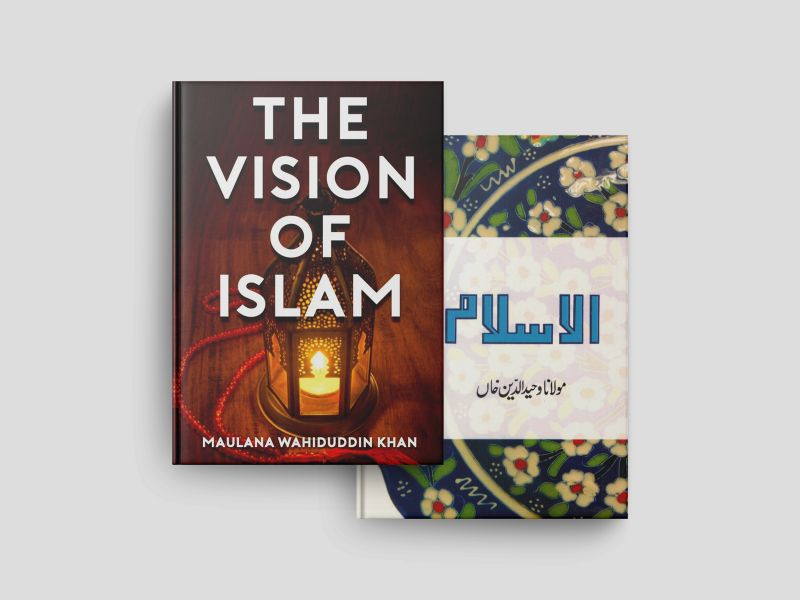
ISLAMIC CENTRE AND AL-RISALA MISSION
Literature-Based Mission

Maulana Wahiduddin Khan established the Islamic Centre (Al-Markazul Islami) in September 1976. He launched the voice of the mission, Al-Risala, Urdu in October 1976 with the aim of developing positive thinking amongst its readers. Acquiring wide circulation in India and abroad, the first issues of its English and Hindi versions were launched in 1984 and 1990 respectively. Maulana said that Al-Risala is a literature-based mission that aims to address modern minds by helping them study Islam in a contemporary style and reminds Muslims of their responsibility of calling people to God. Al-Risala was relaunched in Hindi in May 2021. Its English version is being published as Spirit of Islam since 2013. The magazines, available in print and online formats, continue to take the peaceful message of Islam in contemporary style globally.
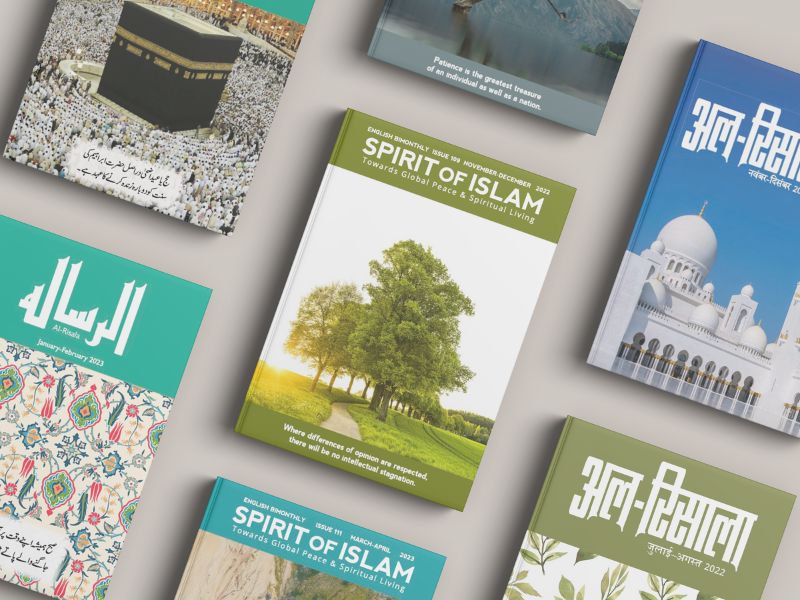
AMBASSADOR OF PEACE
Interfaith Harmony through Dialogue

Maulana Wahiduddin Khan promoted interfaith harmony and conducted interfaith dialogue for mutual learning and peace-building. In 1992, when the atmosphere was highly charged throughout India due to the Babri Mosque incident, Maulana convinced people of the urgent need to restore peace and amity. With other faith leaders, he went on a 15-day Shanti Yatra (Peace March) that contributed greatly to the return of peace in the country. He asked Muslims to undertake interfaith efforts to remove the misunderstandings people have about Islam and undertake peaceful dialogue and become giver members of society. It is because of Maulana’s advocacy of peace throughout the world and his espousal of the cause of communal harmony that he was respected by every circle of society as an ‘Ambassador of Peace to the World.’
UNIVERSAL INTERPRETATION OF RELIGION
Sharing God and His Creation Plan

Maulana Wahiduddin Khan gave a universal interpretation of Islam. Using rational arguments, Maulana proved that Islam—God-centered religion—is the voice of and in harmony with human nature. A human being is created by God, so the right attitude for the believer is to live in submission to God in this world. Islam literally means submission to God. In fact, submission to God is the only religion for both man and the universe. Every creation in the universe is compulsorily submitting to its Creator. As man is free, if he submits to God and behaves righteously of his own choice, he will be amply rewarded for it. God will give him entry into eternal Paradise in return. All of God’s prophets were sent to exhort human beings to follow this course. Every human being needs to be made aware of this.
THE PROPHET OF PEACE
Contribution of Islam and Prophet Muhammad

In his book, ‘The Hundred,’ Dr. Michael Hart mentions the 100 people he believes to have exerted the most significant influence on human history and places Prophet Muhammad in the number one position. In his view, “He was the only man in history, who was supremely successful on both the religious and secular levels.” (Dr Michael Hart, The Hundred, New York, 1978) Maulana Wahiduddin Khan explains that the secret of the Prophet’s supreme success was due to this peaceful strategy. Prophet Muhammad was indeed a Prophet of peace to the world. He not only gave an ideology of peace based on the creation plan of God but also gave a methodology for achieving peace through the Hudaybiyyah model of the Prophet of Islam. That is why he has been called ‘A Mercy for Mankind.’ (Quran, 21:107)
QURAN: IN A CLEAR AND CONTEMPORARY LANGUAGE
Quran Translations in English and Other Languages

The Quran is a revealed book that has been preserved for all time to come. It serves as a guidebook for all humanity. Realizing that in spite of 47 translations of the Quran in English, none had clarity, nor was it in contemporary style, Maulana Wahiduddin Khan along with Prof. Farida Khanam translated the Quran into English. Published in 2009 under the title, The Quran, it has received worldwide acceptance, being considered lucid, easy to understand, and in contemporary English. Maulana gave the call to take the Quran to the world in the Quran Conference 2019. CPS members worldwide and Goodword Books initiated efforts to translate it into all major national and international languages. It is presently available in more than 40 languages. Millions of copies have been distributed free of cost worldwide.
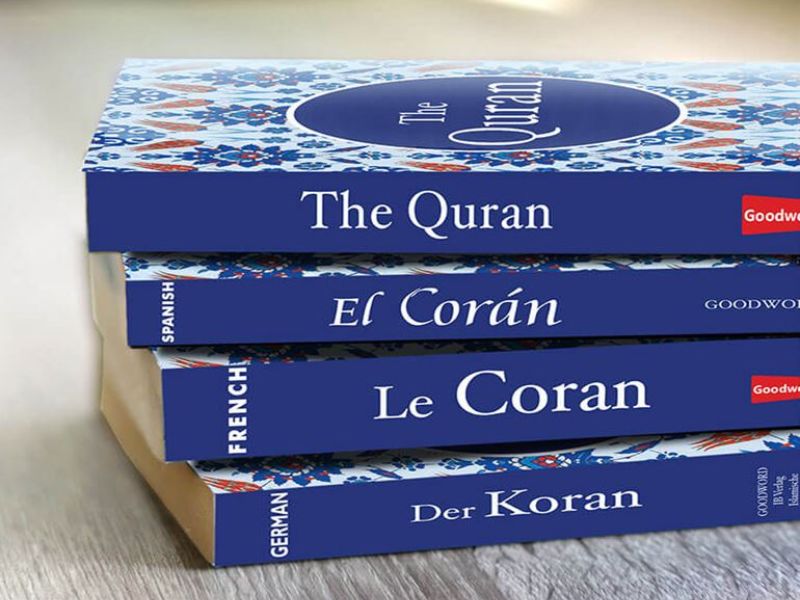
TAZKIRUL QURAN (Commentary of the Quran)
Highlighting the Spiritual Meaning of the Quran

Realizing that existing the Quran Commentaries only offer technical, grammatical, and philosophical explanations of the verses, Maulana Wahiduddin Khan wrote the Commentary titled Tazkirul Quran highlighting the spiritual meaning of the Quran. It is a concise, easy-to-read guide that enables today's readers to understand the deeper meaning of the Quran and reflect upon its verses. The commentary brings out the wisdom and essence of the teachings of the Quran, strengthens one’s bond with God, focuses on the Hereafter, and reminds one of one’s responsibility of communicating the divine message to all mankind through love, and well-wishing. Tazkirul Quran has been translated into English (titled Quran Commentary) (pub. 2011), Hindi (pub. 2008), Arabic (pub. 2021), and Thai (pub. 2021). This commentary of the Quran has received worldwide acceptance.
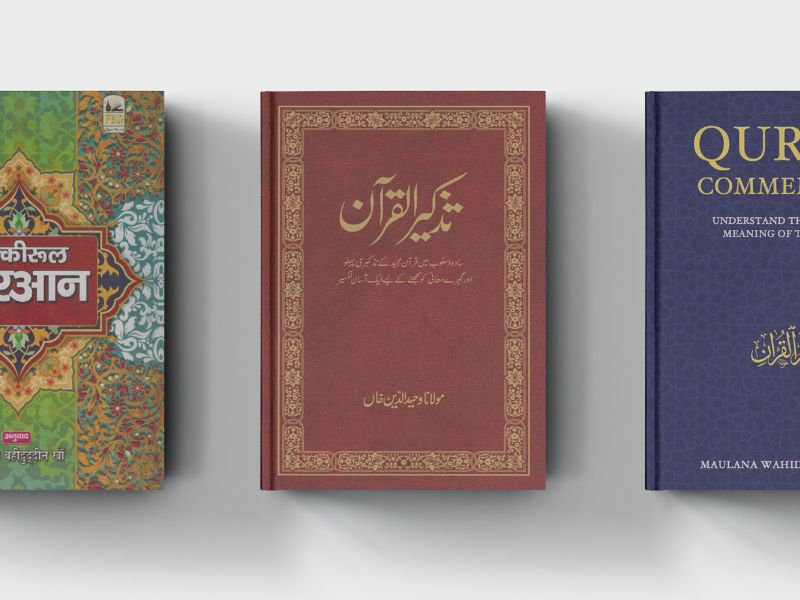
LITERATURE AND TALKS
Supporting Material to the Quran

Maulana Wahiduddin Khan dedicated his life to preparing supporting material to help the reader understand the Quran. He gave the interpretation of the Quran in a contemporary style. Clearing its many misconceptions, he presented Islam in the modern idiom in his works: Al-Risala and Spirit of Islam magazines; more than 200 books, booklets, and pamphlets; and thousands of video and audio lectures. He wrote the Quran Commentary highlighting the spiritual meaning of the Quran. His English Quran translation titled, The Quran is widely accepted as a clear translation in simple language and contemporary style. Understanding Islam as given in Maulana’s books and lectures, one is able to connect himself with God, understand one’s purpose of life, and revive the spirit of Islam in oneself. Anyone who wants to understand Islam need only refer to this material.
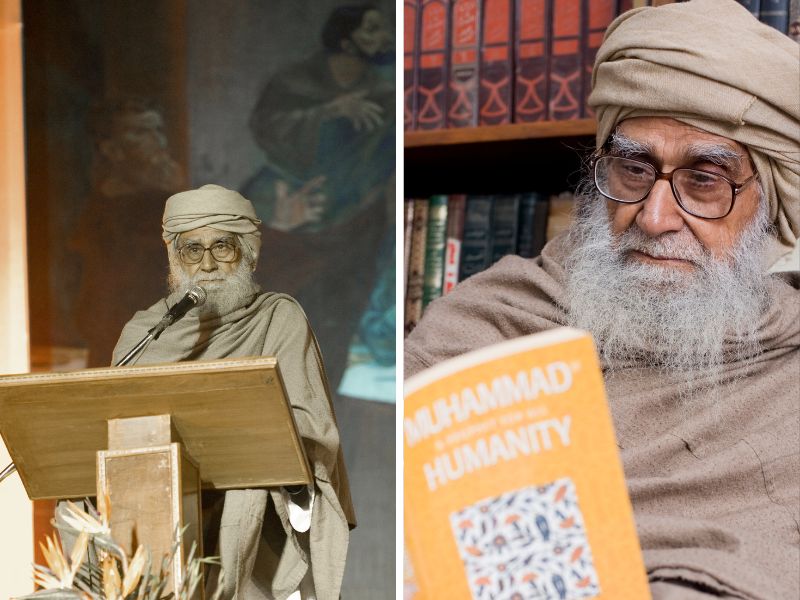
CPS INTERNATIONAL
Culture of Peace through Mind-Based Spirituality

Maulana Wahiduddin Khan’s dream was to present the original teachings of Islam in a contemporary style to address modern minds. This became a reality when he established the Centre for Peace and Spirituality (CPS) as a non-profit, non-political, and non-governmental organization in January 2001, with the goal of a general introduction to Islam
The 21st-century man, despite reaching the peak of material and technological achievements, is still confronted with negative influences such as stress, materialism, and the pressures of the workplace and social living. As such, many succumb to negative emotions such as intolerance, hatred, and retaliation. At an individual level, this is seen as aggression and confrontation, and at the collective level, as violence, war, and terrorism. CPS International promotes and reinforces the culture of peace through mind-based spirituality. CPS along with its chapters help people discover their Creator, His creation plan, and share spiritual wisdom peacefully so that they may develop themselves spiritually, and become contributors to peace.
CPS SPIRITUAL SESSIONS
Re-engineering Minds on God-Oriented Lines

Maulana Wahiduddin Khan said that there is only one way to achieve the goal of spiritual awakening and that is to address the individual mind. The first thing to be done in this matter is to develop individual minds along the correct lines and then form a team of such individuals. Then teams of such individuals should be used for the construction and organization of society. The CPS was established with this ideology in mind. To attain this goal, Maulana started CPS Spiritual Sessions in Delhi in January 2001. By the grace of God, these sessions had an unanticipated success. Towards this end, educated individuals have been trained to form a team who may perform the role of CPS Ambassadors Peace and these people are working in different sections of society. In this way, they may bring about a real revolution. The Spiritual Sessions are being carried forward through senior CPS members: Professor Farida Khanam, Dr. Saniyasnain Khan, and Dr. Rajat Malhotra. All of Maulana's books and videos are available to all.
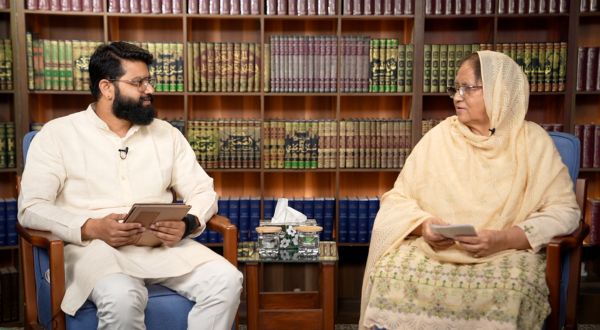
CPS AMBASSADORS OF PEACE
Ushering in a Revolution Based on Spirituality and Peace

Maulana Wahiduddin Khan was an Ambassador of Peace to the world. He made it his life’s mission to prepare literature to help people discover their Creator, and understand His Creation Plan for them. Maulana simultaneously commenced activities to share his wisdom with others. Over decades, he re-engineered the minds of innumerable people to prepare a team of Ambassadors of Peace (AoPs). The CPS Ambassadors of Peace have made it their life's mission to take the message of the Quran and Islam in contemporary style worldwide. Maulana said that it is this team of individuals, who, standing up to every test, will succeed in bringing about the revolution of peace and spirituality that the world has been waiting for, for a long time.
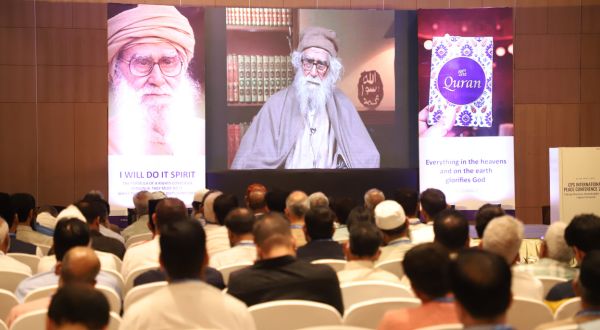
CPS PEACE ACTIVISM
Taking the Divine Message Worldwide

CPS Ambassadors of Peace (AoPs) worldwide have dedicated their lives to taking the universal message of Islam in a contemporary style to all humanity. Trained under Maulana Wahiduddin Khan, they are introducing people to their Creator, and helping them understand His Creation Plan. They are sharing spiritual wisdom with them to re-engineer their minds on positive lines, using the formula: "Change yourself through spirituality—by living a God-oriented life—and you will be able to change the world." Drawing inspiration from the Quran, the preserved word of God, and the Sunnah, the sayings, and the actions of the Prophet Muhammad, they are revealing to the world the true face of Islam based on peace. They are engaged in nation-building, spreading the ideology of peace, countering violent extremism, undertaking peaceful interfaith dialogue, and sharing realistic approaches to conflict management, and peacebuilding.
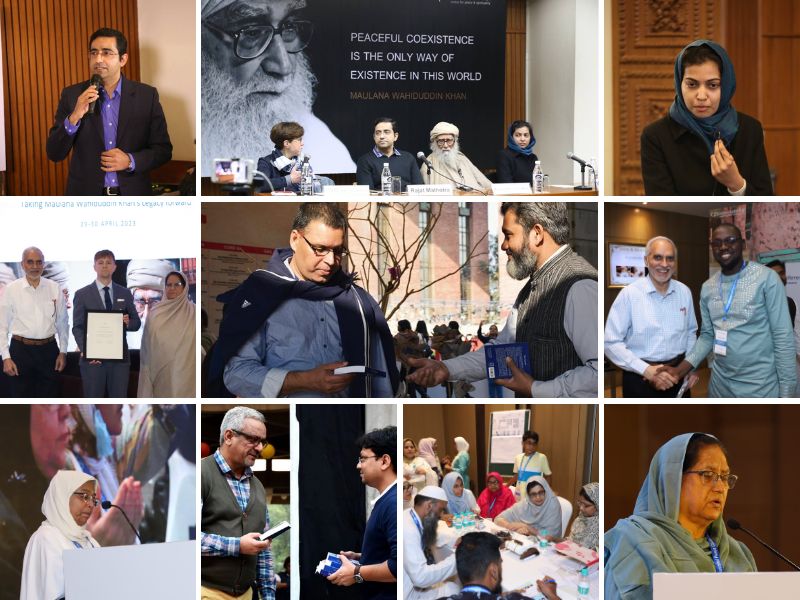
CPS WOMEN
Learning, Connecting, and Volunteering

Maulana Wahiduddin Khan said that the role of women is that of ‘Builders of Humanity’. He always encouraged women members of CPS to develop themselves intellectually so that they can play their role of building humanity. Following the maxim, ‘Ladies First’, he advised women to avail of the numerous opportunities the age has to offer, to perform pivotal roles in CPS. CPS Women e-Platform was launched in March 2020 under the specific guidance of Maulana. Through guided study of Maulana’s literature and talks and interactions, the platform helps women to connect with their Creator, understand His Creation Plan; and prepare themselves to perform their God-given roles. CPS Women have dedicated themselves to the mission, and volunteer for various activities. We invite you to join us at CPS Women Group
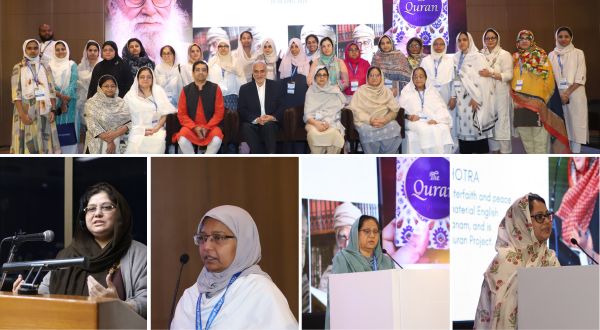
CPS YOUTH
Learning, Sharing, and Peaceful Activism

Maulana Wahiduddin Khan was of the firm view that youth are a great force for positive activism in society. The universal approach in Maulana’s literature and talks address contemporary mindsets especially that of the youth as they are relatively free from conditioning. The study of Maulana’s literature and talks helps to re-engineer the minds of the youth on God-oriented lines, as they are in a position to view things objectively. The CPS Peace Programs are introducing the youth to the mission, and helping them develop positive personalities along duty-conscious lines. Being energetic, they want to do something revolutionary. CPS provides them with plentiful opportunities. Many of them become CPS AoPs, and dedicate themselves to the mission. We invite you to join us at Maulana Wahiduddin Khan
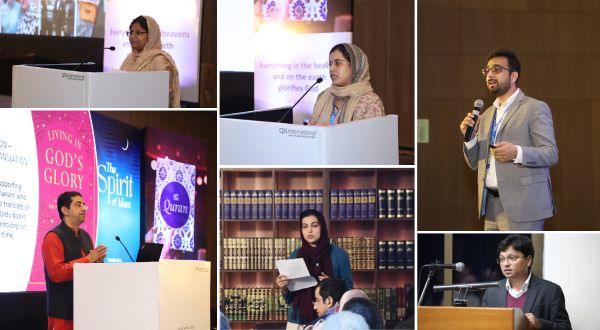
CPS TEAM OF ISLAMIC SCHOLARS
Intellectual Leadership, Reform, and Call to God

Maulana Wahiduddin Khan was a world-renowned Islamic scholar. He explained that Islamic scholars are guardians of people’s way of thinking. To play their role, scholars must leave political activism and work in non-political fields like education and calling people to God, and set the mindsets of people along Islamic lines, guiding them to the right path. Maulana addressed and re-engineered the minds of innumerable Islamic scholars in India and worldwide. He prepared a team of CPS Islamic Scholars who are performing a pivotal role in the mission. They engage in scholarship by preparing material and supporting translations, reform the minds of Muslims towards right thinking, engage in inviting people toward a God-oriented life, and making people understand the importance of conveying God’s message to all humanity through love and well-wishing.
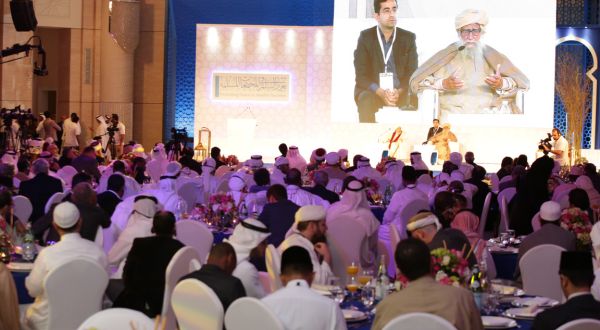
COUNTERING VIOLENT EXTREMISM
De-Radicalizing Mindsets Along Peaceful Lines

Maulana Wahiduddin Khan clarified that Islam does not sanction violent activities like those perpetrated during the 9/11 attacks, the 7/7 London bombings, and the 26/11 Mumbai attacks. Such Muslim militancy finds its roots in the political interpretation of Islam, which has Islamised violence. The Muslims have adopted the culture of violence wrongly in the name of Islam. Maulana deradicalized Muslim mindsets by re-engineering their minds. He provided the Islamic perspective of the very same Quranic verses that were used to radicalize them. This acts as a counter-ideology to re-engineer the minds of extremists along peaceful lines. His books like The Prophet of Peace, Islam and World Peace, and The Age of Peace, help people leave violent extremism on their own and motivate them to start working toward peaceful activism.
PEACE IN KASHMIR
A Journey Towards Peace

Maulana Wahiduddin Khan has been writing about Kashmir since 1968. The positive message of Al-Risala rapidly spread throughout the State, reaching virtually every home. A dedicated team has formed in the region that works amongst the Kashmiris to make them understand Islam’s position on peace, patriotism, and social construct. CPS Kashmir is working to change people’s mindsets along peaceful lines, reiterating that Kashmiris must abandon political activism and opt for inviting people to God. Maulana called for a series of Kashmir Conferences between 2011-2012 for the revival of peaceful activism in Kashmir, in which he released his book, The Dawn Over Kashmir. Interactions with Kashmiris gave a clear indication that they have abandoned political activism in favour of peaceful activism in the fields of education and calling people to God.
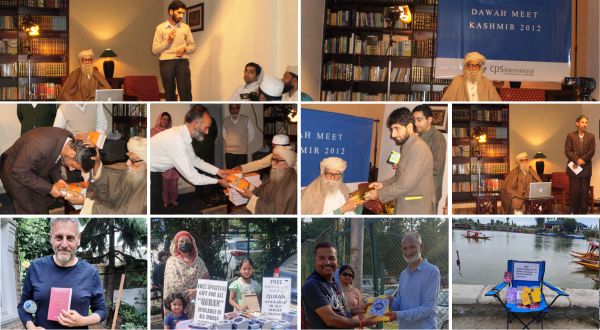
MAULANA WAHIDUDDIN KHAN PEACE CENTER, NEW DELHI
Established Under the Aegis of CPS International

Maulana Wahiduddin Khan Peace Center was established under the aegis of CPS International on April 2, 2016, by Maulana himself. At the Center, we explain that a peaceful society is a prerequisite for progress. When people establish peace for its own sake, this opens up opportunities by creating favourable conditions that allow people to strive towards their positive goals. This is the ideology of peace based on the Prophet Muhammad’s method of the Hudaybiyyah Treaty. At the Center, the CPS AoPs promote and reinforce the culture of peace through mind-based spirituality. We re-engineer people’s minds by sharing the ideology of peace and the practical method to achieve peace. We introduce them to the CPS Peace Program and help them study Maulana’s literature and talks through personal and online interactions.
CPS INTERNATIONAL CENTER, NEW DELHI
Taking the Quran Peacefully to All Humanity

Maulana Wahiduddin Khan made the Quran the identity of CPS and called for a series of Quran Conferences. He launched the ‘Quran Translation and Distribution Project’ (2010) and guided CPS to start developing the CPS International Centre, New Delhi (2015). In response to Maulana’s call to take the Quran to the world (2019), CPS launched the ‘Quran For All Project.’ The CPS International Center has become the focal point for disseminating the peaceful message of the Quran and Islam to the world. The Weekly Spiritual Sessions, interactions, and other programs are arranged there. The vision of CPS is to cause the message of peace and spirituality to enter each and every home of the world. Reaching out to 8 billion people is a herculean task. We invite you to connect with us to fulfill our Prophetic responsibility.
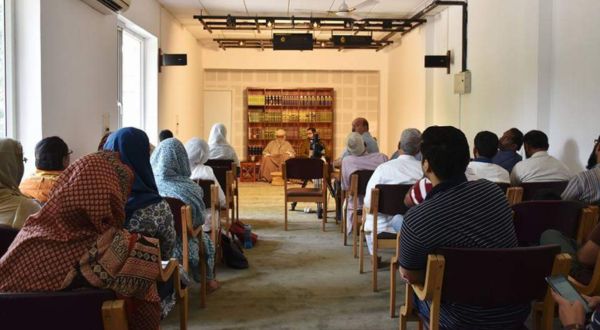
90 YEARS OF PEACE-BUILDING
Awards and Recognitions

For 90 years of peace-building and his lifelong contribution to world peace and unity, Maulana Wahiduddin Khan was nationally and internationally recognized. He was conferred with Demiurges Peace International Award by the Nuclear Disarmament Forum AG under the patronage of the former Soviet President Mikhail Gorbachev in 2002, the Lifetime Achievement Award by the Islamic Society of North America in 2015, and the Sayyidina Imam Al Hassan Ibn Ali Peace Award under the patronage of H. H. Sheikh Abdullah bin Zayed Al-Nahan in Abu Dhabi on 30th April 2015. He was also honoured with the Padma Vibhushan, the second-highest civilian award by the Government of India in January 2021, the Rajiv Gandhi Sadbhavna Award in 2010, the Mahatma Gandhi National Award for Tolerance in 2005, the Communal Harmony Award in 1998, the National Citizen's Award in 1996 from Mother Teresa, and the Diwaliben Mohan Lal Mehta Award in 1996, and the Dilli Gaurav Award in 1995.
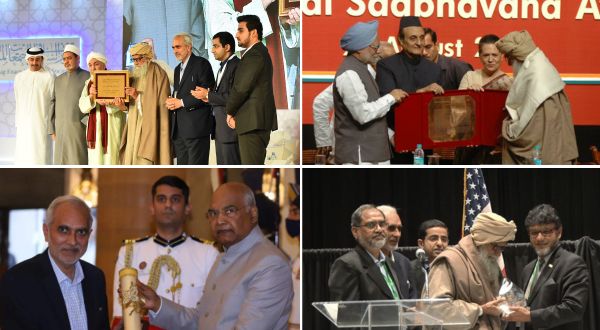
MAULANA’S ADVICE TO THE CPS TEAM
Remain United Despite Differences

Once someone asked Maulana: “After you, who? There is only ‘one’ Wahiduddin.” Maulana replied:
“Only one person is the thinker. With God’s special help, the material to present Islam in a contemporary style has been prepared. Further, a dedicated team has been prepared to take this to the world using various modern means of communication and technology.”
Maulana only gave one piece of advice to the CPS Team: “Remember that differences are an integral part of life. Consensus between individuals will never be attained. Every team member should not allow differences to create rifts in the team. You should stay united despite differences. This will enable you to earn a higher level of reward.” These words of Maulana continue to inspire CPS members who keep re-dedicating themselves to work cohesively as a team to take the message to the world.
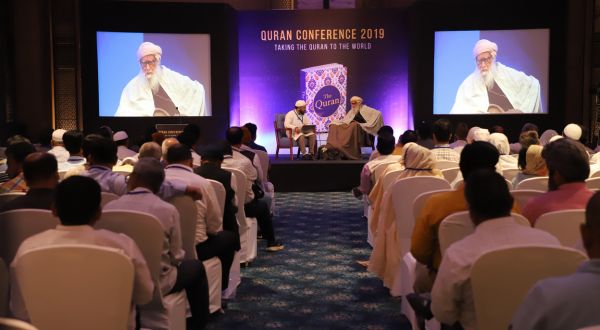
CPS INTERNATIONAL NETWORK
Taking Maulana’s Legacy Forward

Maulana Wahiduddin Khan breathed his last on 21 April 2021 in New Delhi, India. Although Maulana is no longer with us physically, his legacy continues through a treasure trove of wisdom in the form of literature and digital content presenting Islam in contemporary style, and a well-established mission through the CPS Network to take this to the world. CPS International Network has consolidated efforts to take the peaceful message of the Quran and Islam so that it reaches all humanity. We are creating and availing all opportunities for the study and dissemination of the Quran translations, its commentary, and Islamic literature giving the much-needed universal interpretation of religion. During the CPS International Peace Conference 2023, the CPS team and Chapters, AoPs worldwide, a team of religious scholars, and Quran Distribution Centres re-dedicated themselves to the mission. Together, we are taking Maulana’s legacy forward.
